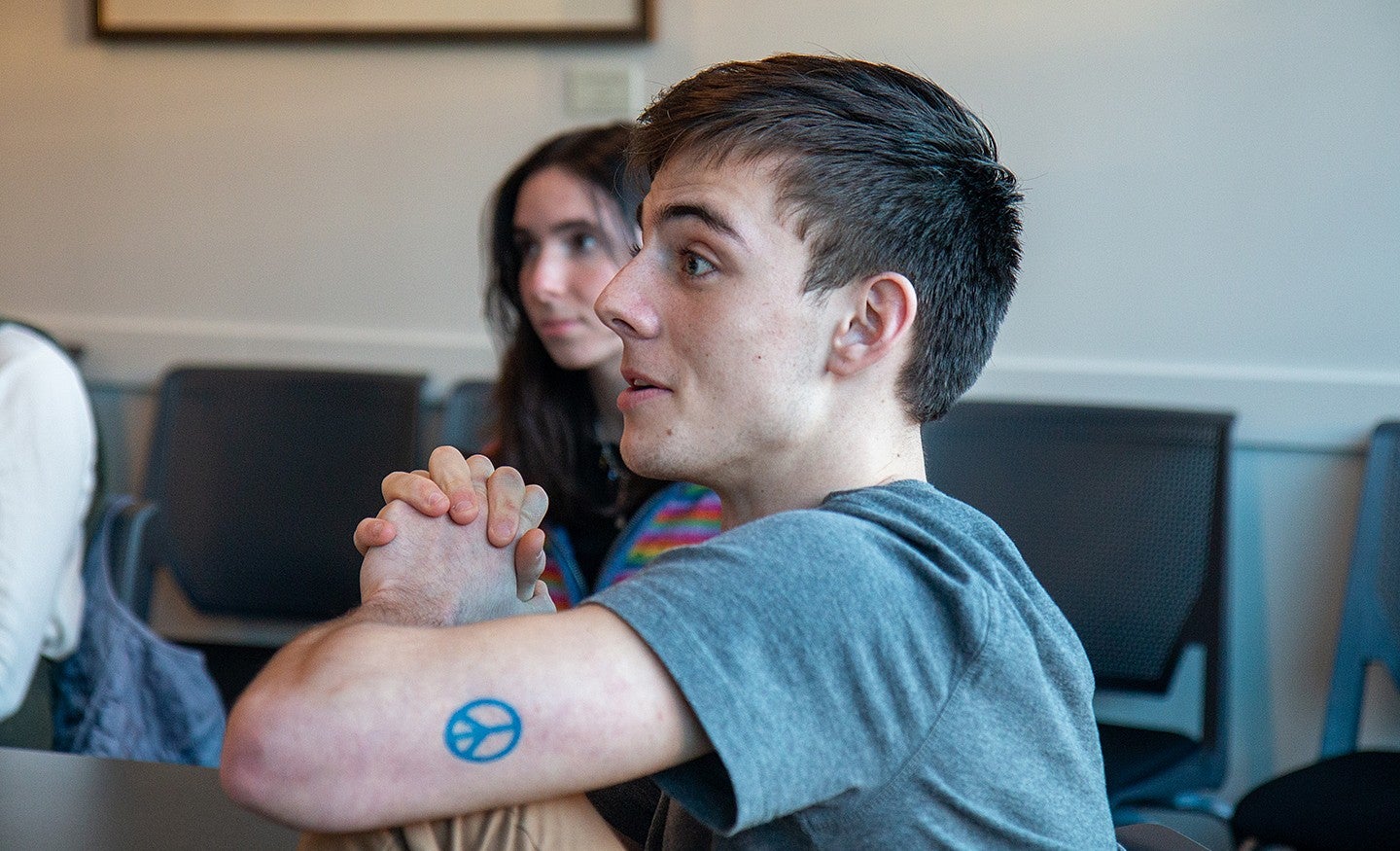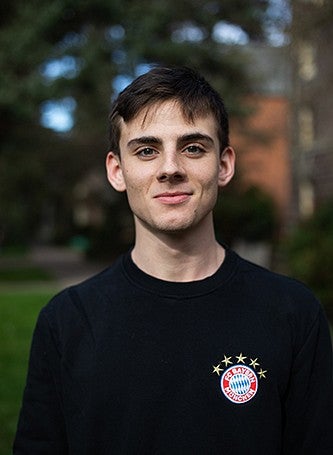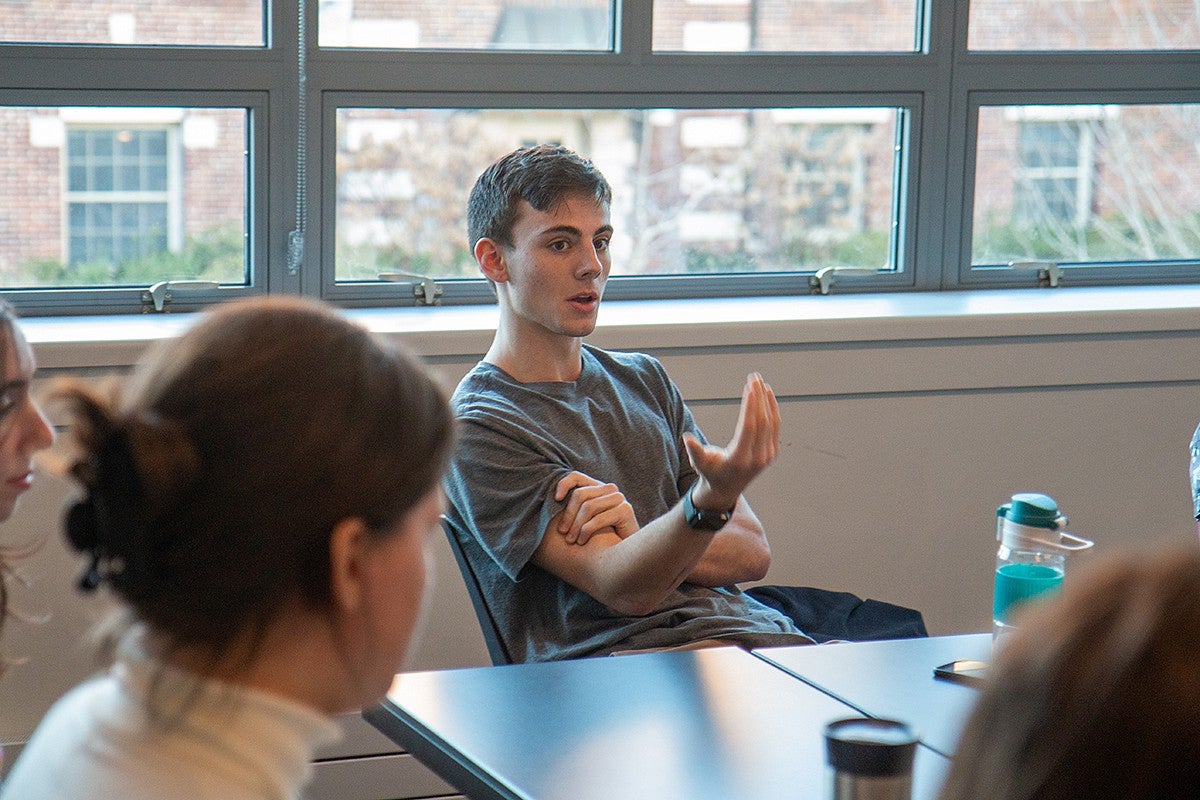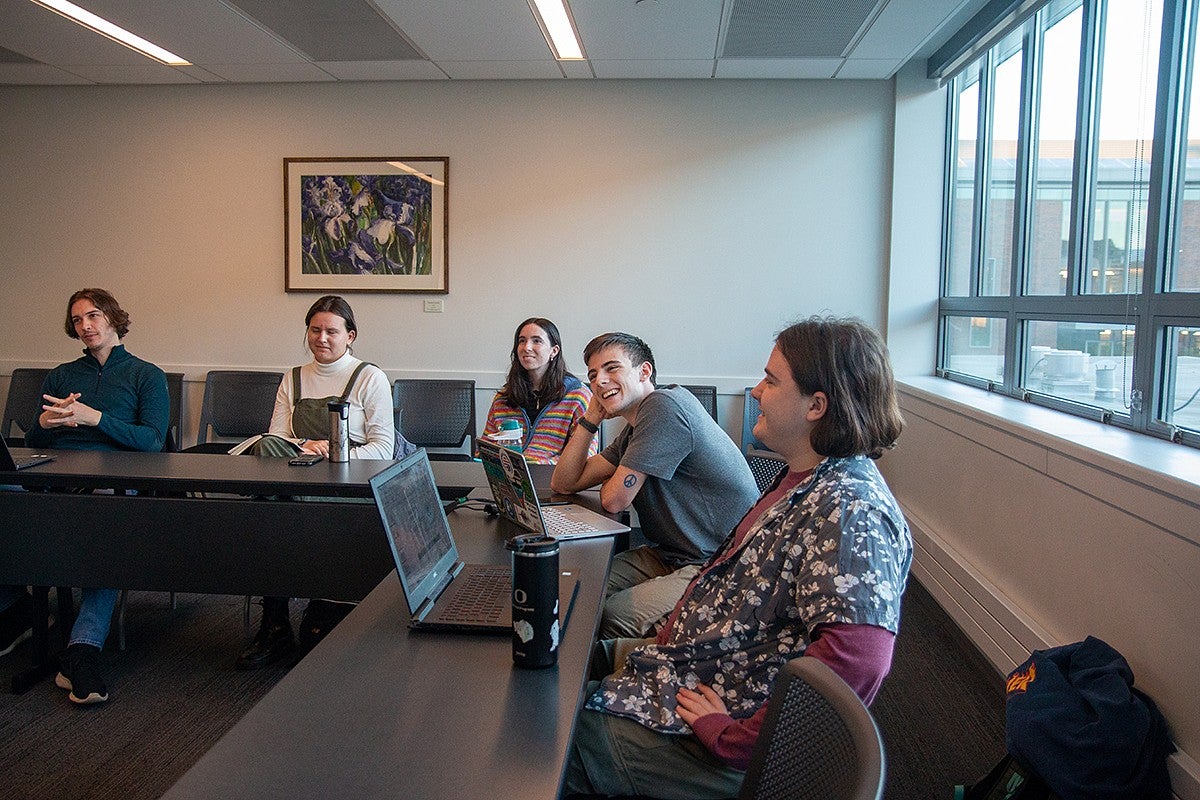
An aim to help overseas

Year in school: Junior
Majors: Global Studies, Geography
Roles: President, UO chapter of the United Nations Association; member, Students for Indigenous Rights and Environmental Justice in Bolivia
Up next: Petrik has been accepted to the world-renowned McDonald Conference for Leaders of Character at the U.S. Military Academy at West Point in March
Pushed by fear, a young woman with family in Ukraine showed up at the UO United Nations Association meeting shortly after Russia had launched its military offensive against the country.
Charles Petrik, the group’s president, had planned to lead a discussion on the group’s structure, the membership list and tackling the global issues of the moment, Ukraine and Russia included.
The woman, a student at UO, raised her hand and asked to address the group of students. She told them that when Russia attacked her home country, she wasn’t able to reach her family for days. She’d been to these meetings before, but wanted to speak up given the recent news, she told them.
“That was a very defining moment,” recalls Petrik, who says the meeting sparked a change in the group. “Getting to hear their story, it was powerful. It made it more real.”
Now, under Petrik’s direction, the group’s meetings have dedicated time for open and honest discussion about the world’s current events. And he’s made a point to invite faculty and campus leaders to meetings to address occurences across the globe in real time.
“It really just gave us motivation, even in times of low attendance, to keep growing and developing the club,” Petrik says. “We saw how healing and powerful the meetings could be for all students.”
Petrik, a junior in the Clark Honors College, is a Global Studies major who has always taken comfort in knowing the world is a lot bigger than his hometown of Silverton, Oregon. He has plans to join the Peace Corps when he graduates because he has always loved to travel. But he’s not simply interested being a tourist in some far-away land. He wants to learn about other cultures and join people in making a difference.
Installing solar panels. Bringing some muscle to creating local gardens to grow food. Whatever the community he’ll be posted to, Petrik will be ready to serve others.
“My goal in life is making sure that everyone has the opportunity to live the life they desire,” he says. “And I think it starts from ensuring and supporting people’s basic access to human rights.”
Petrik has already established a track record for traveling that started with a high school trip to visit seven countries in Europe. Last year, he attended Oxford as part of a prestigious program that studied civil resistance and non-violent protest; one of his favorite parts was a lecture from a monk who was imprisoned and exiled for his role in protesting the current regime in Burma.
And next month, Petrik will travel to the U.S. Military Academy at West Point where he’ll spend three days at the world-renowned McDonald Conference for Leaders of Character. “The McDonald Conference at West Point is something that's going to be another fantastic step towards the difference that I want to make,” Petrik says. “I’m excited to learn from some of the best leaders in the world today. I’m all in.”
Listening to what the world has to say
Known to his family and friends as Charlie, Petrik was raised in Silverton, the older of two children. As a kid, he spent hours playing soccer, swimming at the community pool and running. His mother, Amanda Petrik, recalls spending evenings with the family watching movies of all genres.
“We’d watch a movie and then talk about it for days,” she says, explaining that she and her husband, Frank, wanted to show their children the world from their living room. “I think it’s helped (Charlie) to be authentic to who he really is.”

Even from a young age, his mother noticed his ability to listen. “When you’re learning something about him, he steps back and asks, ‘but what about you?” she says. “He’s so unselfish when it comes to engagement, you know, he obviously has a lot to share, but he’s always having a two-way conversation.”
He was the valedictorian of his high school class and applied to several universities, including Notre Dame, Tulane and Oregon. He wasn’t sure where he’d end up. And then he got a call from his mom when he was on a ski trip.
“I heard yelling on the other end,” he remembers. “And then she told me I got the Presidential Scholarship. I think I ended up in the right place.”
As a freshman, he met Ila Brown, a global studies major. She cared about global politics, human rights, and, most notably for Petrik, joining the Peace Corps. Sharing that passion only made him more committed to his career dream.
Brown remembers being struck by how driven Petrik seemed. “He’s one of the very few people I’ve known that is sure of what they want to do in their life,” she says.
His professors saw that passion in Petrik, too. He entered UO as a data science major. His mom works with data every day, so he figured he’d find a decent enough job. The desire for job security, though, was overshadowed by his motivation to help people. He didn’t have to take a data science course to know his major needed to change.
Spreading his wings, globally
It was Shaul Cohen, associate professor and the leader of Petrik’s First Year Interest Group at UO, who suggested that he consider geography. “He encouraged all of us in the Carnegie Global Oregon FIG to become a geography major,” Petrik says. “He was quite persistent.”
Learning about different countries and the way people lived in other places felt right. After reading through a list of programs online, he declared a double major in geography and global studies. Global studies faculty picked up on Petrik’s love of learning about the world and how he could help.
He remembers sitting in Global Scholars Hall for a course called Perspectives on International Development. He did every assigned reading. He participated in class discussions. He even helped lead the class in a mock consortium.
It was in that class that he met Joel Matheson, a former Peace Corps member and the class’s graduate educator. “It was amazing getting to talk to him about his work abroad,” Petrik says.
“I know I’ve invested a lot into my work, so much passion and time. There are things I’m excited about and want to help change. Even though it can be difficult to push through that, giving up is not an option.”
Petrik joined Associate Professor David Meek for a research project that studies social movements in the United States that are taking trackable action. Meek teaches global studies and Asian studies courses at UO. His project uses Google Alerts to document the types of social movements that are out there, the actions they’re taking and what their intentions are.
Meek praises Petrik for his strong work ethic and his determination. Though he’s the youngest worker on the social movements project, he doesn’t act like it, Meek says. He’s confident, he speaks up at meetings, and he truly cares about the project and the people it impacts, Meek acknowledges.
Whenever Petrik’s schedule becomes overwhelming, he isn’t immune to the occasional bout of burnout. “I know I’ve invested a lot into my work, so much passion and time,” he says. “There are things I’m excited about and want to help change. Even though it can be difficult to push through that, giving up is not an option.”
But he admits that it’s hard to slow down. Every Wednesday, he’s either on Zoom or in Friendly Hall for a Students for Indigenous Rights and Environmental Justice in Bolivia meeting. His first project for the group was documenting where in Bolivia would donations of instruments, laptops and projectors to schools end up.
In March, a handful of indigenous Bolivian leaders will visit the UO at the request of the group, Petrik says. The team raised enough money to bring in several speakers and house them while they take part in the Public Interest Environmental Law Conference. “Sharing their global perspective will be amazing,” Petrik says. “I’m eager to hear about their lives in Bolivia.”
When he spent a week at Oxford, he says it changed is life. Petrik was a fellow at the Oxford Consortium for Human Rights. He learned about peaceful protest and non-violent resistance, topics already in his wheelhouse.
“Getting to connect with leaders and scholars from across the world was invaluable,” he says. “I know that when I want to go abroad again, I’ve got a group of people in my corner.”

At Oxford, Petrik gained several connections. But he also injured himself while running on the uneven cobblestone streets. He tore the meniscus in his knee and could no longer train for a marathon he wanted to run in when he returned to the U.S.
“It was hard to be slowed down like that,” Petrik says. “But I knew I was going to work hard to run again. It’s a calming side-activity.”
The leadership program at West Point is rigorous and regimented. Petrik once considered joining the military before he learned it could affect his potential Peace Corps service.
At the conference, he says he plans to get some rest before each day’s activities. “You wake up at 5:30 a.m. — I’m not kidding — and complete obstacle courses and group exercise before breakfast at 7:30 a.m.,” he says.
After the scheduled morning exercises, he’s looking forward to lectures from National Football League coaches, stock market giants and others. “Students from so many amazing colleges are going to be there,” Petrik says. “I’m most excited to be in a challenging and exciting learning atmosphere and build lasting connections.”
Once he returns from West Point, though, he’ll pick up where he left off. Two ongoing research projects, his clubs and organizations, and his push to start an undergraduate research journal will be waiting for him.
“It’s going to be no surprise to me when Charles makes a name for himself as a leader,” Meek says. “And that’s in whatever particular academic or professional community he immerses himself in.”
